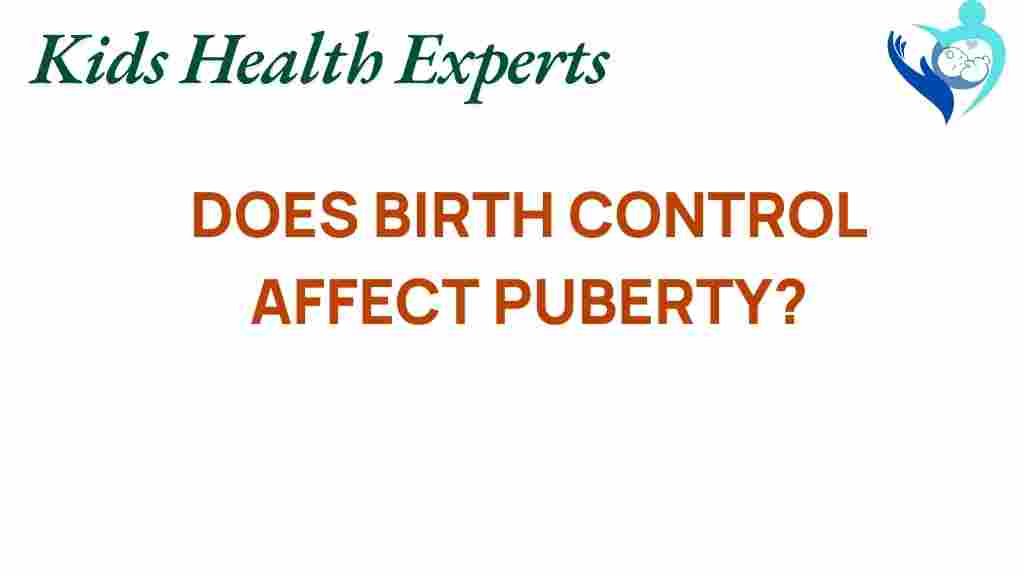Unraveling the Mystery: Does Birth Control Influence Puberty?
The relationship between birth control and puberty is a topic that has sparked much debate and research in the fields of adolescent health and reproductive health. As teenagers navigate the tumultuous years of teenage development, understanding how hormonal changes are influenced by contraceptives is crucial. This article aims to unravel the complexities of how birth control may impact puberty and the overall health of adolescents.
Understanding Puberty and Hormonal Changes
Puberty marks a significant phase in human development, characterized by physical, emotional, and hormonal changes. For both boys and girls, this period typically begins between the ages of 9 and 14. Key changes include:
- Development of primary and secondary sexual characteristics
- Changes in body composition and growth spurts
- Emotional and psychological adjustments
- Menstrual cycles beginning in females
Hormones such as estrogen and testosterone play a pivotal role in these changes. As adolescents grow, their bodies undergo a series of hormonal shifts that prepare them for reproductive maturity. Understanding these shifts is essential when considering the use of birth control.
The Role of Birth Control in Adolescent Health
Birth control methods, including hormonal contraceptives like the pill, patch, and hormonal IUD, primarily aim to prevent pregnancy. However, they also have been studied for their potential effects on various aspects of adolescent health. Here’s how:
- Regulation of Menstrual Cycles: Hormonal contraceptives can help regulate menstrual cycles, making them more predictable and manageable for many adolescents.
- Reduction of Menstrual Pain: Many young women experience significant discomfort during menstruation. Birth control can alleviate these symptoms.
- Acne Management: Some birth control pills are prescribed to help control acne, a common concern during puberty.
- Impact on Mood and Emotional Well-being: Hormonal changes during puberty can lead to mood swings. Birth control may influence emotional stability, although this varies from person to person.
How Contraceptives May Affect Puberty
While birth control is primarily used for contraceptive purposes, its implications on puberty are a growing area of interest in medical research. Key points of consideration include:
1. Timing of Birth Control Use
The age at which adolescents start using birth control can potentially influence their developmental trajectory. Early initiation may alter the natural course of puberty due to the introduction of external hormones.
2. Hormonal Composition of Contraceptives
Different contraceptives contain varying levels and types of hormones. This can affect how the body responds:
- Combination Pills: Contain both estrogen and progestin, which can affect menstrual cycles and hormonal balance.
- Progestin-only Pills: May have different effects on acne and mood compared to combination pills.
3. Long-term Effects on Growth and Development
Some studies suggest that prolonged use of hormonal contraceptives during critical growth periods may impact overall growth and development. However, more research is needed to draw definitive conclusions.
Medical Research Findings
Recent medical research has sought to explore the nuances of how birth control affects puberty:
- A study published in the National Institutes of Health journal suggested that hormonal contraceptives might not significantly delay the onset of puberty but could affect growth patterns.
- Research highlights the need for individualized approaches to contraceptive use, considering each adolescent’s unique hormonal profile and health needs.
- Another study indicated that while some adolescents experienced positive effects from hormonal contraceptives, others reported mood swings and weight gain.
Step-by-Step Process: Choosing the Right Contraceptive
For adolescents and their guardians, navigating the world of birth control can be overwhelming. Here is a step-by-step guide to making informed decisions:
Step 1: Assess Individual Needs
Consider personal health history, menstrual cycle regularity, and any specific concerns such as acne or severe menstrual pain.
Step 2: Consult a Healthcare Provider
Schedule an appointment with a healthcare provider who specializes in adolescent health. They can provide tailored advice based on medical history and lifestyle.
Step 3: Discuss Options
Explore all available contraceptive options, including:
- Hormonal pills
- Hormonal IUDs
- Implants
- Barrier methods (e.g., condoms)
Step 4: Evaluate Potential Side Effects
Understand the potential side effects of each contraceptive method. Discuss these with your healthcare provider to find the best fit.
Step 5: Monitor Changes
After starting any contraceptive method, keep track of any changes in mood, weight, or menstrual cycles. Regular check-ins with a healthcare provider can help manage any concerns.
Troubleshooting Common Concerns
While using birth control, it’s essential to be aware of potential issues that may arise:
1. Irregular Periods
It’s common for the body to take time to adjust to hormonal contraceptives. If periods remain irregular after three months, consult your healthcare provider.
2. Mood Swings
Some users may experience mood changes. If these become severe or disruptive, a different method may be necessary.
3. Weight Gain
Weight changes can occur with hormonal contraceptives. If weight gain is significant, it’s advisable to discuss alternative options with your doctor.
In conclusion, the interplay between birth control and puberty is complex and multifaceted. While contraceptives can offer significant benefits in managing menstrual health and other adolescent concerns, it is crucial to approach their use with a comprehensive understanding of potential effects on hormonal changes and teenage development. Ongoing medical research will continue to shed light on these important issues, allowing for informed decisions that support the reproductive health and overall well-being of adolescents.
For more information on adolescent health and birth control options, consider visiting Planned Parenthood.
For further reading on hormonal changes and puberty, check out this resource here.
This article is in the category Conditions and created by KidsHealthExperts Team
